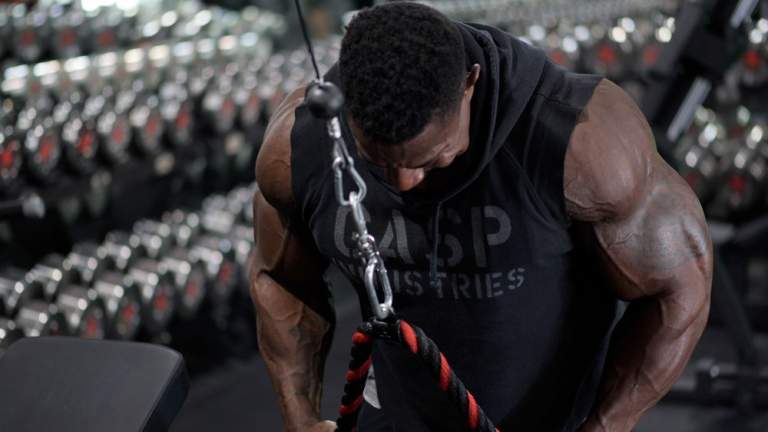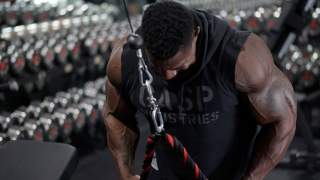Training hard is the logical thing to do when you want to see gains in the gym. Youve set goals for yourself and want to achieve them in the least possible time.
For example, that competition youve had your eye on for so long. Youve probably already enrolled for it.
You want to be fit and prepared enough to be at your best.
But wait
What if youre overtraining?
Oh yes, overtraining really is a thing.
The general notion is that the more training you undergo, the better your chances of achieving quality results.
Heres the thing:
This is not entirely true.
And this is why people make mistakes and suffer burnouts or, even worse, various degrees of injury.
So what exactly is overtraining?
Overtraining refers to training beyond required or adequate measures. You might think you are pushing yourself beyond your limits, but what youre actually doing is over-exerting your body.
Eventually your rigorous training will take its toll on your body. This can lead to various injuries, more especially if youre not doing the exercises routines correctly.
In this article, well be going over the training injuries you expose yourself to when overtraining.
And later on
How to overcome a training plateau
Lets get started
Injuries from overtraining
When you overtrain, you are liable to suffer different injuries.
Overtraining injuries refer to the muscular and skeletal injuries humans suffer as a result of overt physical activities; usually, more than the body can take.
When you learn how to get certified as a personal trainer, you also get to understand what leads to most training injuries.
How?
Well, most personal training certifications require that you learn subjects such as physiology. This is so that you can teach your clients the correct motions when doing exercise routines. In order to minimize injuries for them and maximize muscle gain.
Most injuries from overtraining often occur when you increase your body pressure, or you change your training plan to a more stringent one.
When you force your body to do more than it can take, youre risking an overtraining syndrome.
Heres the thing:
This isnt limited to overtraining injuries. It also includes fatigue and other symptoms.
One thing we can all agree on is that:
Beginners are the most vulnerable to overtraining injuries.
We see it all too often in the gym.
When many of them start, they are too eager to achieve rapid results in a short space of time.
But
This does not apply to newbies only. Even experienced athletes are susceptible to tears, strains, and twists.
Symptoms of an Overtraining Injury
When you begin to overtrain, youll feel various symptoms. Some of them include:
1. Fatigue
When you start to feel tired regularly or lack the energy to do anything, you might be overtraining. Youll feel demotivated to engage in any physical activity.
2. Irregular sleep
Remember:
Getting enough sleep is just as important as the effort you put in at the gym.
If your sleep pattern is disturbed and you cannot sleep as well as you used to, it might be due to overtraining.
You might sleep late and wake up early. In some situations, you can sleep longer than youre expected to.
3. Dip in concentration
Overtraining might cause you to lose concentration.
You might start feeling uninterested in many things. It might lead to forgetting lots of things, losing focus, and having a foggy feeling.
4. Abnormal heart rate
Your heart rate might become irregular because of overtraining. You might start breathing faster than normal, even when you are not engaging in any physical activity.
The types of overtraining injuries you can encounter are not limited to the visible injuries that occur as a result of slips and falls.
You can also sprain your wrist, ankles, and other body parts. Furthermore, your joints might suffer from constant aching too.
Worse still, you might fracture your body parts.
Having said all that, is there a way to overcome training injuries and bounce back?
Well, fortunately, there are just a few things you can focus on if you feel the symptoms of overtraining setting in.
How to overcome overtraining injuries
There are various ways you can overcome training injuries and be back to full fitness.
Lets check a few of them out.
Adequate rest
Sometimes, all your body needs is plenty of rest. After all the hard work, it deserves a bit of rest. Therefore, rest as much as you can. Your body will repair itself and rebuild all the wear and tear.
Youll recuperate while at it.
Slow down
You need to slow down on your work rate too. Its the reason you suffered an overtraining injury anyway. Reduce the pace and energy exerted. Youll be back to normal in due time.
The truth is, not only individuals engaging in various training regimes can suffer overtraining injuries. It can also happen to personal trainers. Therefore, everything we have mentioned applies to all personal trainers too.
Thats not all; personal trainers experience training plateaus too.
Do you feel demotivated to continue engaging in any physical activities? Are you not achieving the results you desire? Are your clients beginning to doubt your effectiveness? Thats a training plateau.
When you hit a training plateau, you will:
lose massive strength
fail to make a muscle pump
lack motivation to engage in exercise
record stagnancy in your workout sessions
lose passion
feel incessant irritation
feel an increase in heart rate
and lose appetite
You might wonder why a training plateau occurs.
Stay tuned.
Overtraining
It is the biggest cause of a training plateau. Personal trainers go through various training regimes every day.
As a personal trainer, youre highly susceptible to overtraining, and it can cause a training plateau.
Your body needs a new challenge
As a personal trainer, you’re likely administering similar training regimes on your clients. You do nothing out of the ordinary because their training process is gradual, and you have to maintain that fashion.
Key takeaway:
The same training regimes might be the cause of your training plateau.
Variety is the spice of life as they say. This also applies to your body.
Your body may want new challenges. It is accustomed to particular regimes. It wants something different; something extraordinary.
You can work around your training schedule and create time to exercise your muscles in ways different from the regular. You need to change everything the machines, the pressure, the plan, the distance.
If you jog for three miles, increase it by a mile or two. If you were lifting 100 kg, you might reduce it but increase the reps.
Ensure you alternate your training plan every three weeks to prevent your body from getting used to a particular plan.
Professional personal trainers indeed build different training plans. Your plan might be entirely different from what other personal trainers do.
You can sign up for their training sessions as a client too. Do not think of it as ridiculous. It is a way to improve yourself.
Ensure your training sessions do not clash with your clients. It wont bode well for your brand.
Post-training plateau? What to do
When you finally overcome your training plateau, you need to transition back to your normal training regime. It is because eliminating the training plateau requires that you need to add to your normal training regimes.
Therefore, you need to stop your plateau-busting techniques and continue with the normal.
Conclusion
Overtraining is dangerous; dont do it. If you do, take adequate measures to curb it. Also, when you hit a training plateau, get out of it fast with our effective methods.
Tyler Read Bio
Tyler Read is the owner of ptpioneer.com which is a website dedicated to helping people get started in the personal training industry. He helps people discover, study and pass their fitness exams.












3 Comments
Comments are closed.